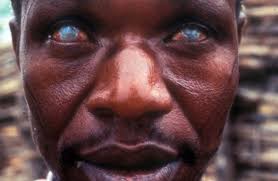 Onchocerca volvulus is a parasitic filarial worm responsible for causing onchocerciasis, commonly known as river blindness. The parasite is transmitted to humans through the bites of infected blackflies (genus Simulium), which breed in fast-flowing rivers and streams, making rural and tropical areas particularly vulnerable. Once inside the human host, the larvae mature into adult worms that form nodules in subcutaneous tissue, where they can live for up to 15 years. The adult worms release thousands of microfilariae (larvae), which migrate through the skin, causing intense itching, skin lesions, and eventually lead to the severe damage of tissues in the eyes, resulting in blindness.
Onchocerca volvulus is a parasitic filarial worm responsible for causing onchocerciasis, commonly known as river blindness. The parasite is transmitted to humans through the bites of infected blackflies (genus Simulium), which breed in fast-flowing rivers and streams, making rural and tropical areas particularly vulnerable. Once inside the human host, the larvae mature into adult worms that form nodules in subcutaneous tissue, where they can live for up to 15 years. The adult worms release thousands of microfilariae (larvae), which migrate through the skin, causing intense itching, skin lesions, and eventually lead to the severe damage of tissues in the eyes, resulting in blindness.
The impact of onchocerciasis can be devastating, especially in communities where blackflies are endemic. Long-term infection not only causes chronic skin problems and debilitating itching but also leads to irreversible visual impairment and blindness. The mass administration of ivermectin, an antiparasitic drug, has been an effective treatment strategy, as it kills the microfilariae and halts disease progression. Ivermectin does not kill the adult worms, but repeated annual or semi-annual treatments significantly reduce the parasitic load and prevent blindness. Early treatment and preventative measures such as vector control can drastically improve health outcomes, especially in high-risk regions, ultimately reducing the socio-economic burden caused by this parasitic infection.



